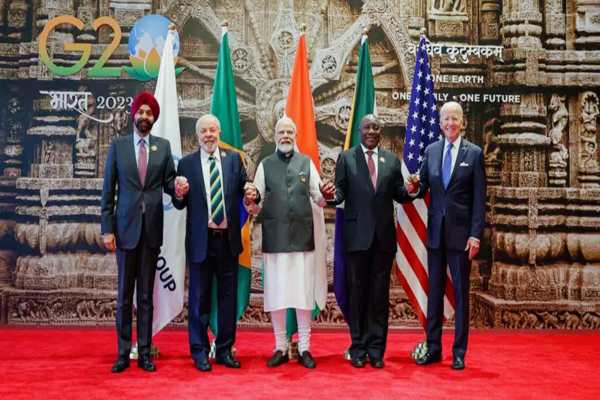On Saturday, the opening day of the G20 meeting under India’s chairmanship came to a satisfactory conclusion. On Sunday, the meetings go into day two. Participants in this summit included the leaders of G20 member states and representatives from international organizations.
In addition, the African Union, a permanent member of the G20, is taking part in the meeting.
At the conclusion of this yearly conference, a declaration is typically released. On the first day of the conference, it was revealed that a consensus had been reached about the G20 declaration.
The G20 member nations have agreed on the Joint Declaration of the G20 Summit, according to Prime Minister Narendra Modi, who arrived at the G20 Media Center.
The entire group of journalists applauded when Narendra Modi made this declaration.
Later, at a news conference at the media center, External Affairs Minister Jaishankar and Finance Minister Nirmala Sitharaman provided additional details on the joint declaration.
First to speak was Minister of External Affairs Jaishankar. “In today’s conference, we made several significant decisions. We emphasized robust, inclusive, and inclusive growth in the joint declaration, he added.
Nirmala Sitharaman, the Union Finance Minister, spoke after him. “We shall involve all communities in our efforts to find answers to the problems facing the planet. India is dedicated to making sure that the Southern Hemisphere nations’ voices are also heard when decisions are made here, the official stated. India, according to her, “has considered the opinions of everyone in the group and suggested solutions that are acceptable to all.”
In fact, despite the ongoing Russia-Ukraine conflict, reaching international agreement on this proclamation is the toughest hurdle.
Will the group’s disagreements about the conflict in Ukraine result in a formal joint declaration? As analysts expressed uncertainty, Modi’s announcement grabbed attention.
Russia’s actions towards Ukraine were harshly denounced at the summit in Bali the year before. Moscow and China, however, objected vehemently to the G20 platform’s censure of Russia after that.
India then assumed the G20 chairmanship following that. Since then, there have been numerous stories claiming that India, the conference host, is having trouble getting agreement on the conference manifesto from all participating nations.
There was no agreement on the declaration even during the G20 finance and foreign ministers’ meetings, which were presided over by India.
All of the member states were pressured by the West to firmly denounce Russia’s war on Ukraine.
But it was opposed by China and Russia. They were unable to publish a joint manifesto as a result.
Amitabh Kant, a senior officer from India and a G20 member, asserted that the conflict in Ukraine should not be discussed in the G20 group.
He asserted that the conflict in Ukraine affects all of Europe. The developed world’s issues are causing a financial crisis.
Diplomacy by Prime Minister Narendra Modi has been effective.
“They voiced mistrust toward us (India). But we did it,” prominent journalist KV Prasad stated.
Numerous media outlets praised India, the host nation, for its accomplishments. According to Prime Minister Narendra Modi, only foreign policy could make this happen.
“The toughest problem is truly persuading the leaders of 20 countries on a certain issue. Only India’s initiative made this possible, according to KV Prasad.
According to a lot of media reports, Prime Minister Modi has had diplomatic success.
India has not yet issued a public statement denouncing Russia’s attack on Ukraine.
With the West and Russia, it has been able to maintain equilibrium. Taking a neutral posture toward this conflict, it asserts that peace must be established.

